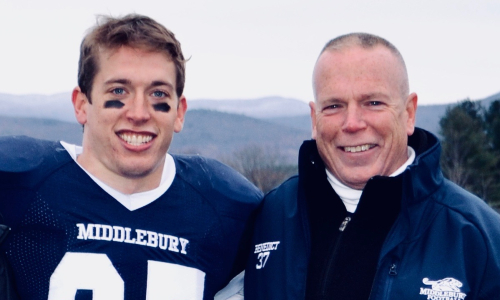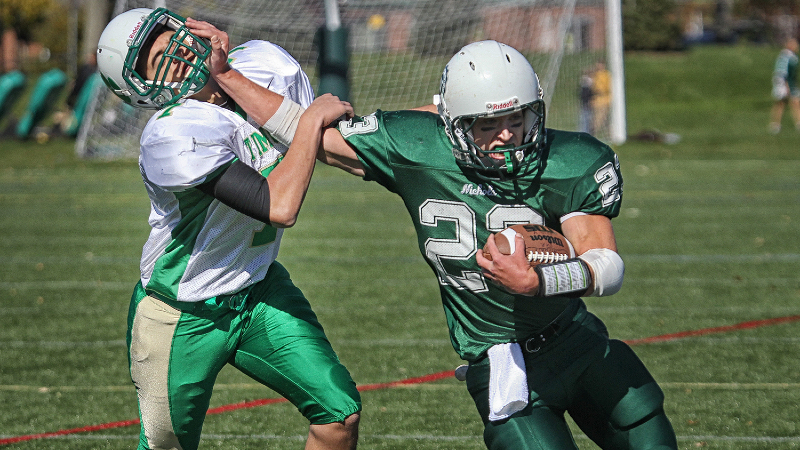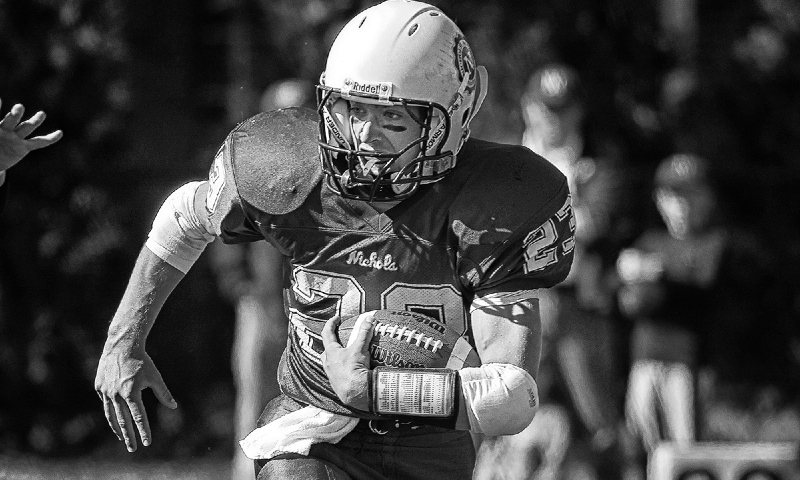Legacy Stories
Matthew Benedict's One Last Goal
Matthew Benedict had it all - a stable, supportive, loving family. A strong, compassionate, loving girlfriend. Plenty of friends who cared for him deeply. He had a dedicated work ethic, was surrounded by a faith which was part of daily living, radiated a magnetic personality, possessed natural leadership qualities, and was provided a solid education from schools filled with excellent, caring teachers and professors. He was humble and kind, sensitive and loving. He was beautiful on the inside and out and was one of the toughest human beings we have ever known.
All of that wasn’t enough to save him. On July 1, 2019, Matthew died by suicide at age 26. We want to share his story to raise awareness of the seriousness of the symptoms of concussion, erase the stigma surrounding those who suffer from mental health issues, and help other student athletes struggling with Post-Concussion Syndrome (PCS) so they understand they are not alone.
This article adheres to the Suicide Reporting Recommendations from the American Association of Suicidology.

Matthew Benedict's One Last Goal
By Bill and Anne Benedict
Looking back on Matthew’s life we often wonder: what went wrong? We believe the brain injuries he sustained in his youth played a significant role. His first concussion came at a very young age. It was a collision with a baseball and his eye socket. There were other hits to the head we did not know of - childhood games in the back yard, collisions in football, hockey, and lacrosse. Matthew never wanted to be a burden. Matthew was three years old when he started playing organized hockey. He started soccer soon after, then lacrosse and football all by the age of 12. Matthew was a fierce competitor who would sacrifice himself for a win.
He was rarely sick, and when he was, he would will himself better. We can count on one hand the number of times he went to the doctor because of illness. He was healthy physically and mentally until late in 2013, when he sustained a couple of hits to the head in a game while playing defensive back for the Division III Middlebury College football team. True to form, he tried to “will” himself better and hid his PCS out of embarrassment. Plus, he didn’t want anyone to worry about him. We never even knew he started experiencing symptoms of PCS after those hits until he fessed up two months later when he was home for winter break, and he couldn’t hide it from us any longer.
Matthew never complained, but in January of 2014, when we took him to the doctor for his lingering concussion symptoms, he revealed that from a very early age he had his “bell rung” more times than he can remember. He never considered his “bell rung” incidents as sub-concussive hits or concussions, and he never told us about them until it was too late, and the damage had already been done.

In May of 2015, one-and-a-half years after he suffered those debilitating hits, and the day after he graduated from Middlebury College, Matthew wrote a piece called “Start the Conversation Now…Life is Precious.” This was the first time we realized how badly Matthew was hurting. Before then, we were concerned, but not alarmed. This piece rocked our world and deep down we knew Matthew may be in serious trouble. Here are some of his words from that piece:
“Before I begin, I do not want to hear any words of how courageous I am because frankly it is the opposite. It is much easier now that I graduated to tell my story, so I apologize for not having more courage…I do not like to draw attention to myself and often get embarrassed in front of crowds or when other people talk about me. I have suffered two severe episodes of depression these past two years. These times have been the scariest times of my life and have lasted many months. Not scary because I was actually scared, but scary because I felt nothing at all. The emptiness was devastating and it was beyond frustrating not knowing what really caused it.
The first episode was right after the football season of 2013… the season ended and I was honored 2nd team all-NESCAC and then was voted team captain by my peers and teammates at our awards banquet a few weeks after the season ended. This was one of the worst things for me that made my depression even worse. My self-confidence and self-worth tanked so much that I figured I was not worthy of any award or leadership position and any thoughts of the future made it worse. How was I supposed to be a captain when I didn’t even have confidence in myself? Or what would my teammates think when they found out about it? I wanted to hide from everyone and everything. I could not carry on a conversation of any depth and most conversations were people congratulating me. Congratulating me on what? Not being able to get out of bed? For taking hours and hours to work in the library only writing a paragraph? I had no reason to be congratulated. I wasn’t working out and I was setting a terrible example for my team. I stopped calling home, going out with friends, or having any joy in life. I withdrew from everyone and everything and could not even look the wonderful beautiful girl in the face to say I could not carry on our relationship after a few months leaving her heartbroken and confused. Every time I hid I later on regretted it more and more which made me feel even worse. Self-harming thoughts began to creep in… I felt like everywhere I went people knew right away about me and were judging me ruthlessly. I refused to tell my friends and family the extent I was feeling because I was embarrassed. I was ashamed of myself… I was such a coward. I was a terrible person. My teammates thought I was this great guy and to be honest I was not being that at all. I thought I was going to flunk out and my future was over. I thought I had made it all this way only to fail the first semester of my senior year. I thought I would let my school, team, friends, and ultimately family down. Some captain I was…”
After Matthew wrote those words and published them online, he felt the stigma in revealing his weaknesses to the world. He later wrote: “it is the most frustrating thing to feel ostracized from others or feeling like they look down on you because you have been suicidal in the past. It is bad enough the guilt we carry around for considering suicide that we do not need to feel judged by others.”
Matthew often commented that after he went public with his mental health struggles, people looked at him and treated him differently. He tried to go on with his life, reluctantly agreeing to meet with different doctors, but he avoided them as much as possible because he didn’t feel there were any answers to his problems. He believed most people didn’t understand him. It’s not like he had a broken leg that could easily be diagnosed and fixed… he had a broken brain. We were in constant search for a proper diagnosis, treatment or a cure for Matthew, but we simply couldn’t find the answers he so desperately needed.

Matthew continued his life as best as he could. Enrolling in law school, earning an excellent GPA some semesters and having to medically withdraw from other semesters because of anxiety, depression, and feeling like he was the dumbest student in school. In January 2019, about five years after his initial diagnosis of Post-Concussion Syndrome, he wrote thoughts about ending his life, but like the other times, he did not share his thoughts with anyone. After he passed, we found these notes he wrote about six months before his death:
“The first time I thought about suicide was my junior year of college. My football team had won a share of the league championship. I was voted team captain. I was seeing my dream girl and she was a golden girl herself. I fell in love for the first time. I was killing it, no pun intended.
Despite all the success, I fell into a deep depression for the first time in my life. All of a sudden, my whole livelihood was ripped from my eyes. I had no idea how it happened. Towards the end of the football season I had the game of my life versus Trinity College our nemesis. In the 4th quarter the quarterback, who was a 200 pound 5’ 10” raw athlete, ran me over full speed. I do not remember getting up from the hit. But the coaches would have had to drag me off the field to remove me from the game. I kept silent and hid from it. It was for the Championship. I made 19 tackles and was named player of the week for my league. I knew I was concussed but I was too proud to admit it. The adrenaline was through the roof. All I had trained for and worked so hard for was on the line during that game. I was chasing the glory of being a Champion. We did it. We won the flashy rings. A game I will never ever forget. Besides the quick bit after that hit. After the game, I went out and got drunk to celebrate. My teammates knew my head was bothering me but I told them I was fine. I wasn’t.
Three weeks later I went home to see my family for Thanksgiving. They had no idea how bad things were. I played it off like I was still the golden boy. I had learned how to put on a good show for the outside world. When I returned I slept for most of the day. Stopped going to class. Lied to my friends about going out while I was by myself. Stopped responding to my friends. Ran away from the girl of my dreams. I felt worthless… My whole life was a lie. I was no Golden Boy. I was a coward. I was weak. That is what I told myself…I went on a drive one night to try to clear my mind…It was a life altering experience.”

Six months after Matthew wrote this, nearly six years after he was diagnosed with PCS, Matthew died by suicide. His PCS robbed him of his ability to see the value in his life and how much others loved and respected him. It robbed him of his ability to think clearly and love deeply. On the day Matthew died, we believe his soul had already been stolen from him.
According to the National Institute of Mental Health suicide is a complex public health concern, and there is no single cause. Suicide most often occurs when stressors and health issues converge to create an experience of hopelessness and despair.

At the time of Matthew’s death, he was a summer associate for a law firm. He cherished his inalienable rights of liberty and freedom. In life, he relentlessly tried to search for the truth. Unfortunately, we remain without answers about his death. We do know, though, when Matthew attempted to be transparent about his mental health, he felt judged. This led him to avoiding opening up to loved ones and discontinuing appropriate treatment. Even though he realized this was a problem, he was reluctant to properly address it because the stigma was so powerful. We feel Matthew would have wanted us to resume his battle by helping others realize that mental health is just as important as physical health, and “it’s OK not to be OK.” He would have hoped others could live and be free from the shame associated with mental illness. We believe he would have encouraged us to spread the message so others would not feel the guilt he felt. We know he would have wanted all of us to be kind and not abandon each other during our times of need. In one of the pieces Matthew wrote and published, he had some advice for all of us:
“…Start the conversation. No more hiding. No more silence. Speak up. Reach out. Tell people you love them. Make the community and the world a better place. Mental health is no fun but it is necessary to talk about. Don’t be like me. Don’t wait. Be brave…You see what others have and often compare yourself… I still regret my actions and will never fully be able to forgive myself but I challenge you to not be like me... If we want to make the world a better place we must act. We cannot be silent…Tell everyone you love them every single day and treat those you don’t know with the same love… start the conversation now… life is precious…keep the conversation going…and listen…don’t just hear, but listen to those you love and listen to everyone around you…make sure they know they matter.”

Suicide is preventable and help is available. If you are concerned that someone in your life may be suicidal, the five #BeThe1To steps are simple actions anyone can take to help someone in crisis. If you are struggling to cope and would like some emotional support, call the National Suicide Prevention Lifeline at 1-800-273-8255 to connect with a trained counselor. It’s free, confidential, and available to everyone in the United States. You do not have to be suicidal to call. If you’re not comfortable talking on the phone, consider using the Lifeline Crisis Chat.
If you or someone you know is struggling with lingering concussion symptoms, ask for help through the CLF HelpLine. We provide personalized help to those struggling with the outcomes of brain injury. Submit your request today and a dedicated member of the Concussion Legacy Foundation team will be happy to assist you.
Suicide Prevention Resources

Nobody should have to go through a crisis alone. Dial 9-8-8 if you or a loved one is in crisis or suicidal.
Suicide Prevention Lifeline
We can all play a role in preventing suicide. Learn the five steps to help you #BeThe1To support someone in crisis.
#BeThe1To Resources